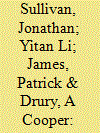| Srl | Item |
| 1 |
ID:
092260


|
|
|
|
|
| Publication |
2009.
|
| Summary/Abstract |
Much has been written on the triangular, and increasingly high-profile, China-Taiwan-US relations. However, scholars have yet to apply Diversionary Theory to the China-Taiwan dyad. DT argues that leaders may resort to international conflict when domestic political and economic situations become troublesome, aiming at directing public attention away from problems at home. While creation of explicit military conflict in the Taiwan Strait by Taipei is deemed quite unlikely, more subtle processes of diversion might be expected instead. This article applies a variant on DT to assess whether leaders in Taipei have used rhetoric about Taiwan independence or unification as a distraction from domestic problems during the years leading up to Taiwan's 2004 presidential election. We find that, as the president's approval sinks, pro-independence rhetoric becomes more likely. Overall, the results of this study confirm extension of DT to the case of Taiwan and encourage further research applied to middle powers.
|
|
|
|
|
|
|
|
|
|
|
|
|
|
|
|
| 2 |
ID:
102761


|
|
|
| 3 |
ID:
131262


|
|
|
|
|
| Publication |
2014.
|
| Summary/Abstract |
Recent patterns suggest that states are using economic sanctions more frequently. However, sanctions fail to achieve intended political or economic goals most of the time. To account for this anomaly, I introduce a culture-based explanation. The rationale is that sanction effectiveness cannot be solely judged by norms and standards of sender countries. Target countries' cultural norms play an important role in explaining sanction effectiveness. Using cases of US economic sanctions against China, I show that the norms and beliefs of target countries play an important role in defining sanction effectiveness. The implication of the study is that senders of economic sanctions must take cultural responses and sensitivity of targets into serious consideration in order to deploy credible and successful economic sanctions as a foreign policy tool.
|
|
|
|
|
|
|
|
|
|
|
|
|
|
|
|